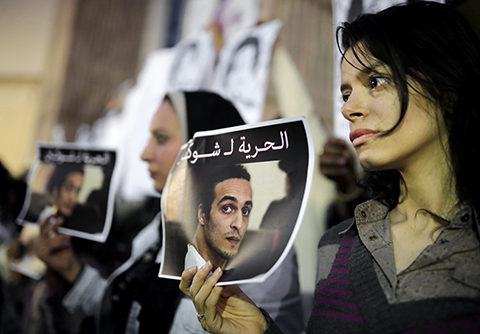 Egyptian journalists hold posters calling for the release from prison detention of Mahmoud Abou-Zeid, known as Shawkan, in front of the Syndicate of Journalists building in Cairo, Egypt, Wednesday, Dec. 9, 2015. Shawkan was arrested in August 2013 while taking photographs of the government’s violent dispersal of a sit-in by supporters of ousted Islamist President Mohammed Morsi and has spent over 800 days locked up without charges. (AP Photo/Amr Nabil)
Egyptian journalists hold posters calling for the release from prison detention of Mahmoud Abou-Zeid, known as Shawkan, in front of the Syndicate of Journalists building in Cairo, Egypt, Wednesday, Dec. 9, 2015. Shawkan was arrested in August 2013 while taking photographs of the government’s violent dispersal of a sit-in by supporters of ousted Islamist President Mohammed Morsi and has spent over 800 days locked up without charges. (AP Photo/Amr Nabil)
CAIRO: An Egyptian judge yesterday postponed the trial of 739 people accused of murder and staging an armed sit-in because they would not fit inside the courtroom cage. Judge Hassan Farid said he received a letter from the Cairo security directorate stating police would be unable to move the defendants from prison to the courthouse after cage expansion works had stalled. The trial was adjourned until Feb 6.
The defendants are among thousands rounded up at a protest site in August 2013. Supporters of former President Mohamed Morsi of the Muslim Brotherhood staged two Cairo sit-ins in June that year just before the military ousted him. They are charged with planning and participating in an armed gathering, the murder of police forces tasked with breaking up the gathering and the possession of weapons without a licence, among other charges. The seven-week standoff turned into a bloodbath when security forces killed hundreds of Brotherhood supporters as they cleared the two protest camps in one of the bloodiest days in Egypt's modern history. Eight policemen were also killed.
Dozens of policemen and civilians were killed in violence after the protests were cleared. The authorities went on to arrest thousands of Brotherhood members and banned the group in a fierce crackdown on the world's oldest Islamist movement. Egypt's mass trials of Brotherhood members and people accused of links to the group, as well as its tough crackdown on Islamist and liberal opposition alike, have drawn international criticism of its judicial system and human rights record. Defendants attend trials inside a courtroom cage in most Egyptian trials.
Two policemen jailed
In another development, two police officers were sentenced yesterday to five years in jail by an Egyptian court for torturing a lawyer to death in a police station in February, a rare penalty against members of the security forces. Lawyer Karim Hamdy, 27, was arrested in February on charges of taking part in anti-government protests organised by the Muslim Brotherhood, the movement that the military removed from power in mid-2013. He died two days after his arrest after sustaining fractures to the ribs, bruises and bleeding in the chest and head, the initial forensic report showed.
The lieutenant colonel and major with the national security agency were found guilty of torturing Hamdy to death. More than 200 lawyers are behind bars in Egypt for defending the government's Islamist opponents, according to attorneys and human rights groups. Egyptian police, notorious for human rights abuses during the rule of autocrat Hosni Mubarak, melted away during an uprising which toppled him in 2011. They have since made a strong comeback, with rights groups saying police brutality is widespread in Egypt.
The sentence, which can be appealed, comes a day after nine other policemen were referred to a criminal court and charged with beating to death a father of four. He was one of at least three men who died in police custody in the space of a week in November, prompting riots in his home town and rare media scrutiny of police methods. Despite the growing outcry over such allegations of abuse of suspects, critics blame a culture of impunity for police still only rarely being held to account and have called for an independent body to investigate abuse cases.
The Interior Ministry has said it would investigate all abuse allegations. An end to police brutality was one of the key demands of the 2011 uprising that ended Hosni Mubarak's 30-year rule. Unlike in the past, the families of those who have died in custody have been vocal in their demands for transparent investigations. "The verdict is a condemnation of the torture policy in police station and confirms that the victim was tortured and killed by the two officers," lawyer Mohamed Othman, representing Hamdy's family, told Reuters. "The verdict is a message to all those in power who make light of people's dignity."- Agencies

